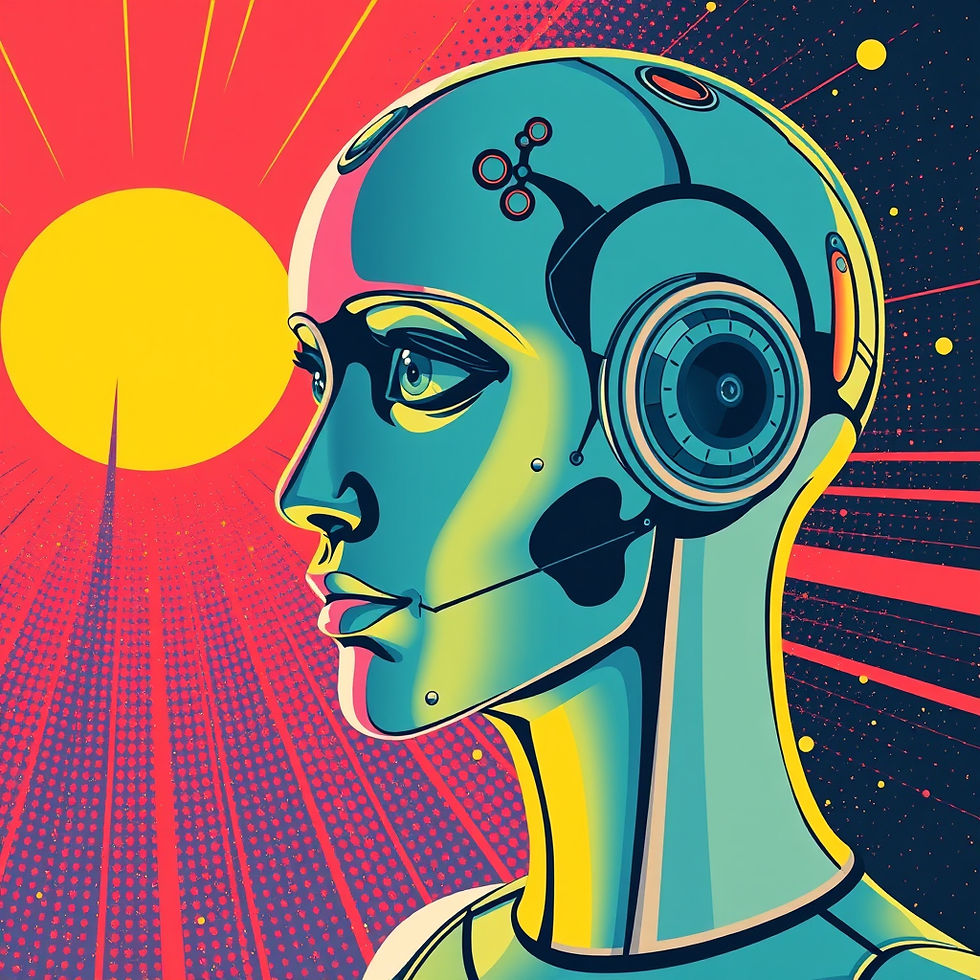The Rise of the Autonomous Workforce: AI Agents
- Jul 30, 2025
- 5 min read
The world of Artificial Intelligence is experiencing a profound shift. We're moving beyond mere chatbots and static tools to an era where AI systems are becoming increasingly autonomous, capable of perceiving, reasoning, and acting on their own. This is the emergence of AI agents, and it's set to redefine how we live, work, and interact with technology.
What Exactly Are AI Agents?
At their core, AI agents are software systems designed to pursue goals and complete tasks on behalf of users with a remarkable degree of independence. Unlike traditional programs that follow rigid, pre-defined rules, AI agents possess key capabilities that make them truly intelligent:
Autonomy: They can make decisions and initiate actions without constant human oversight.
Reasoning and Planning: Leveraging advanced large language models (LLMs) as their "brain," they can strategize, break down complex problems into smaller steps, and choose the most effective course of action.
Memory: They learn from past interactions and experiences, building a knowledge base that improves their performance over time.
Tool Use: They can integrate and utilize various software tools and APIs to gather data, perform calculations, generate code, and interact with external systems.
Adaptability: They can adjust their behavior and workflows on the fly in response to new information or changing environments.
Think of them as digital collaborators, but with a significant leap in their ability to proactively solve problems and execute multi-step processes.
A Brief Evolution: From Simple Reflexes to Proactive Partners
The journey to AI agents has been a fascinating one:
Early Days (1950s-1980s): Initial AI focused on symbolic reasoning and rule-based systems, like ELIZA, which could simulate conversation but lacked true understanding or adaptability.
Rise of Machine Learning (1980s-2000s): This era saw the shift to data-driven models. Machine learning enabled systems to learn from data, leading to advancements in areas like image recognition and spam detection, but models remained largely task-specific.
Foundation Models (2010s-Present): The advent of deep learning and transformer architectures, particularly with models like GPT-3, revolutionized AI. These large-scale models, trained on vast datasets, demonstrated "emergent capabilities" – an ability to generalize and perform tasks without explicit training, laying the groundwork for more sophisticated agents.
Today, the integration of LLMs with "Large Action Models" (LAMs) is propelling AI agents into a new frontier, allowing for not just understanding and reasoning, but also robust execution.
The Impact Across Industries: A Transformative Force
The implications of AI agents are far-reaching, promising to revolutionize various sectors:
Increased Productivity and Cost Reduction: By automating complex, repetitive tasks, AI agents free up human workers to focus on higher-value activities like creativity, strategy, and decision-making. Industries from manufacturing to finance are already seeing significant cost savings and efficiency gains.
Enhanced Customer Experience: AI-powered customer service agents provide instant, personalized, and 24/7 support, leading to higher customer satisfaction and reduced wait times.
New Business Models: Agents can enable entirely new services and products, from hyper-personalized marketing strategies to AI-as-a-Service platforms.
Improved Decision-Making: With their ability to rapidly analyze vast datasets, AI agents provide real-time insights for more informed and accurate decision-making in fields like finance and healthcare.
Scalability and Resilience: Digital AI agents can expand or contract their execution capacity in real time, adapting to workload fluctuations and ensuring continuous operation even during disruptions.
Innovation and Creativity: By handling the mundane, AI agents empower human teams to dedicate more time to innovation and complex problem-solving.
Relevant Use Cases: Agents in Action
Here are some concrete examples of how AI agents are transforming or are poised to transform various domains:
Software Development:
Automated Code Generation and Refinement: Developers can instruct an AI agent to build specific software modules. The agent can then write code, test it, identify bugs, and even optimize performance, significantly accelerating development cycles.
Autonomous Testing and Debugging: Agents can simulate user interactions, identify vulnerabilities, and even propose fixes for software issues without constant human intervention.
Customer Service and Support:
Proactive Problem Resolution: Beyond simple chatbots, AI agents can monitor customer behavior and system diagnostics to proactively identify and resolve potential issues before a customer even realizes there's a problem. For instance, an agent could detect a recurring payment failure pattern for a customer and automatically initiate contact with relevant solutions.
Personalized Sales and Recommendations: Agents can analyze individual customer preferences and past purchase history to provide highly tailored product recommendations and guide them through complex purchasing decisions.
Research and Development:
Automated Literature Review: In scientific research, agents can sift through millions of academic papers, identify relevant information, summarize findings, and even synthesize new hypotheses, drastically reducing research time.
Drug Discovery: AI agents can analyze vast biological datasets to identify potential drug candidates, simulate molecular interactions, and even design new compounds, accelerating the R&D process in pharmaceuticals.
Operations and Logistics:
Supply Chain Optimization: Agents can monitor global supply chains in real-time, predict potential disruptions (like port delays or material shortages), and automatically reroute shipments or adjust production schedules to minimize impact.
Resource Allocation: In complex systems like data centers or manufacturing plants, agents can dynamically allocate resources (e.g., computing power, machinery) to ensure optimal performance and energy efficiency.
Personal Assistance:
Intelligent Scheduling and Task Management: Future personal AI agents could not only manage your calendar but also anticipate your needs, book appointments, handle communications, and even proactively resolve conflicts, acting as a highly capable personal assistant.
Financial Planning: Agents could monitor your financial accounts, analyze spending patterns, provide personalized budgeting advice, and even execute trades based on pre-defined strategies, helping you achieve financial goals.
Imagine AI agents streamlining supply chains, predicting equipment failures, optimizing recruitment processes, or even assisting in drug discovery – the possibilities are immense.
The Road Ahead: Challenges and Opportunities
While the potential is undeniable, the emergence of AI agents also brings important considerations:
Trust and Governance: As agents gain more autonomy, establishing clear guardrails, ensuring transparency, and addressing ethical concerns like bias and accountability will be crucial.
Integration Complexity: Integrating AI agents seamlessly into existing systems and workflows requires careful planning and execution.
Job Market Evolution: While agents automate tasks, they also create new roles and opportunities, requiring a focus on upskilling and reskilling the workforce.
Continuous Improvement: The field is rapidly evolving, demanding ongoing research and development to enhance agent capabilities, address limitations, and ensure robust performance in real-world, unpredictable environments.
______
The emergence of AI agents is not just a technological advancement; it's a fundamental shift in how we conceive of work and intelligence. As these autonomous systems become more sophisticated, they will undoubtedly reshape industries, enhance human capabilities, and unlock unprecedented levels of efficiency and innovation. The future, powered by intelligent AI agents, is truly an exciting one to behold.



Comments